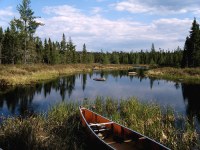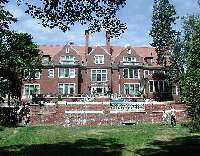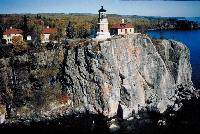Duluth Travel Guide
Situated on the westernmost end of Lake Superior, the largest freshwater lake in the world, Duluth's international harbour is filled with ships and the city bustles with sailors and the arrival of new wares. Although miles from either coast, Lake Superior is connected to the Atlantic Ocean via the St Lawrence River. The authentically restored waterfront can be explored along the Lakewalk Trail, or the scenic Skyline Parkway drive above the lakeshore on the bluffs, which affords magnificent views of the city and harbour.
The city itself is quiet, yet there is much to see and do in Duluth. Because of its location, it has always been a busy shipping port, and there are enough antique shops, cafes, restaurants, and other diversions. The city's two universities ensure the bars and pubs are always bustling during the semester. Kids will enjoy the Great Lakes Aquarium and the Lake Superior Railroad Museum, while adults will enjoy the well-preserved house and grounds of the Glensheen Mansion.
The spectacularly scenic Minnesota State Highway 61 (North Shore Scenic Drive) follows the shore of Lake Superior for 160 miles (257km) from Duluth to the Canadian border, its precipitous cliffs interspersed with pretty little harbour towns, charming shops and restaurants, waterfalls, and beautiful lake-view picnic sites.
The Split Rock Lighthouse is popular for hiking, picnics, and photo opportunities. There are several state parks and hiking trails along the way, including the long distance Superior Hiking Trail, and the unspoilt beauty of immense Boundary Waters Canoe Area Wilderness that draws canoeists from around the world to its pristine lakes and streams. 40 miles (64km) north, Gooseberry Falls State Park has excellent walking trails.
Duluth is roughly two and a half hours' drive from Minneapolis, the nearest major city and airport. The best time to visit Duluth is in autumn, when the fall foliage is truly spectacular. Winters can be unforgivingly cold, while late summer provides idyllic weather for enjoying the spectacular scenery.
Things to do in Duluth
Duluth, a seaport city, is home to many rewarding sightseeing experiences. Both sunny days and rainy days can be occupied with many interesting things to see and explore. Whilst the city is a quiet one, there are museums, galleries, and theatres to enjoy, keeping the historically and culturally enthused occupied.
Attractions such as the Fitger's Museum, exhibiting memorabilia from what was once the most successful brewery in the state, or the Lake Superior Railroad Museum, where people can climb up one of the world's largest steam locomotives, make for a memorable visit. For those interested in art, the Tweed Art Museum is always a popular choice too, exhibiting over 7,000 art objects.
The outdoors is a large part of what makes Duluth and its attractions special to visitors. Hiking in any one of the several state parks is a joy, especially the long distance Superior Hiking Trail and the trails accessing the untouched beauty of the Boundary Waters Canoe Area Wilderness. Split Rock lighthouse is also a popular landmark to explore, allowing fresh air and scenic splendour. Duluth is home to many quaint harbour towns, which make good excursions from the city, complete with charming shops and cafes to enjoy after a day of outdoor activity.

Boundary Waters Canoe Area
Part of Superior National Forest, the Boundary Waters Canoe Area (also known as the BWCA), is an immense chain of lakes in north-eastern Minnesota that is extremely popular for canoeing, camping, and fishing. With more than a million acres of pristine wilderness, it's no wonder the Boundary Waters is the most visited wilderness area in the United States. Visitors can hike through forests and canoe along thousands of miles of water routes. No motor vehicles or boats are allowed in the park, and there are strict guidelines as to visitors leaving the area as they found it. Combine this with the fact that visitors may explore for days without seeing another person, and it's easy to understand why the Boundary Waters is the perfect place to get lost in nature. The best time to visit the Boundary Waters come in the summer months (June to August), as summer temperatures are warm but rarely exceed 90F (32C). Entry points include Ely in the west, and Grand Marais in the east. Both towns have numerous outfitters where canoes, kayaks, and camping equipment can be hired. Camping permits are required.

Glensheen Mansion
This 39-room Jacobean Revival mansion on the shores of Lake Superior is a popular attraction in Duluth. Managed by the University of Minnesota, the Glensheen Mansion is listed on the National Register of Historic Places. The 7.6-acre grounds and carriage house can be explored at leisure, and the lavishly furnished interior of the house is accessible on informative guided tours lasting 60 to 90 minutes. A new attraction is the night-time 'flashlight tour', which focuses on the lives of the servants of the house. Visitors should be sure to ask the guides about the various ghosts that are said to inhabit the mansion.

Split Rock Lighthouse
A popular tourist attraction outside of Duluth, Split Rock Lighthouse is located on the shore of Lake Superior, and was constructed following a major storm in 1905 that caused 29 shipwrecks. The lighthouse was decommissioned in 1969, and is now operated by the Minnesota Historical Society, who have restored it to its 1920s condition. The lighthouse offers tours and children's programmes, and has a gift shop. Its picturesque location in Split Rock Lighthouse State Park makes it a popular destination for bicycling, cross-country skiing, and camping; both the Superior Hiking Trail and the Gitchi-Gami State Trail run through the park, making it ideal for hiking. Even for visitors who aren't inclined to hike, the beauty of the rocky shore has earned it a place on many postcards from Duluth and Northern Minnesota, and is a stunning place for a picnic.
Getting Around
The Duluth Transit Authority operates a number of scheduled bus routes that include access to the airport, The University of Minnesota Duluth and Park Point Recreation Area. One-way fares are $0.75 during off-peak hours, or $1.50 during peak travel periods (7am-9am and 2.30pm-6pm). Day passes are available for $4; exact change is required. Many visitors find that renting a car is the easiest way to get around Duluth, especially if they wish to explore the beautiful North Shore area. Rideshare options include Lyft and Uber.
Duluth Climate and Weather
Duluth's climate varies drastically throughout the year. Summers are hot and humid with average temperatures ranging between 50F (10C) and 76F (24C); while winters are bitterly cold, with temperatures dropping as low as -4F (-20C). The best time to visit Duluth is in the autumn (September and October), when the fall leaves turn spectacular colours, while summers (June to August) offer the chance to enjoy outdoor activities. Winters in Duluth are best avoided unless visitors are avid snowmobilers.
United States of America travel info
Electricity
The electrical current is 120 volts, 60Hz. Plugs are mainly the type with two flat pins, though three-pin plugs (two flat parallel pins and a rounded pin) are also widely used. European appliances without dual-voltage capabilities will require an adapter.
Language
English is the most common language spoken but Spanish is often heard in the south-western states.
Money
The official currency is the US Dollar (USD), which is divided into 100 cents. Only major banks exchange foreign currency. ATMs are widespread and credit cards are widely accepted; Apple Pay and Google Pay are very popular. Banking hours are Monday to Friday 9am to 3pm.
Tipping
A 15 percent tip is expected by taxi drivers, bartenders, hairdressers and waiters, but travellers shouldn't tip in fast-food or self-service restaurants. In expensive restaurants or for large parties, the tip should be 20 percent of the bill. It's normal to tip staff such as valets and porters in hotels; this is discretionary, although a minimum of $5 is expected. Most services are customarily tipped if the service is good.
Health
There are no specific health risks associated with travel within the USA. Medical facilities are excellent, but expensive. Only emergencies are treated without prior payment and treatment can be refused without evidence of insurance or proof of funds. Good medical insurance is essential.
Safety
Travel within the United States is generally trouble-free, though travellers should be aware that the US shares with the rest of the world an increased threat from terrorist incidents. Security has been heightened, particularly at airports. Restrictions on hand luggage apply and travellers are advised to check on the latest situation with airlines in advance. Travellers should also be alert to the dangers of car and street crime in cities and should use common sense and take basic precautions. Hurricanes are common between June and November, putting the southern USA, including the Gulf Coast and the eastern US at risk. There's a risk of wildfires in many dry areas in the US, particularly on the West Coast from March to November.
Local customs
Laws vary from state to state, including speed limit, fines and punishment. The age at which alcohol may be legally bought and consumed is 21 years.
Doing business
In such a large country, filled with so many diverse groups, business practices may differ according to each state, though rarely to any large degree. The East Coast is traditionally more formal than the West Coast, though in states such as California, dress code and conservative appearance are as common as they would be in New York. Punctuality is important throughout the country and it's considered rude to be late for a meeting. Gift-giving is uncommon as it may be construed as bribery. Appropriate titles (Mr, Mrs, Ms) are used upon introduction and until otherwise stated. Americans favour politeness and greetings of 'Hello' and 'How are you?' are often expressed with sincerity. Business hours may vary in each state, but an 8am start and 5pm finish Monday to Friday is the most common with an hour over lunch.
Status and age are not necessarily indicative of seniority, nor do they carry much weight in themselves. Those doing business in the States should be mindful of this fact; foreigners should never make assumptions about someone's position or rank. Best practice is to be respectful to all parties. That said, the US upholds a hierarchal business structure in which 'the boss' is the ultimate decision-maker. Senior leaders have the power of the last word, and can go against the grain just as easily as they can follow popular opinion. Foreigners should concentrate on winning over this individual, even if the greater group seems unsupportive. Americans value a direct style of communication. In this fast-paced, consumer culture 'time is money', and small-talk is viewed as unnecessary and wasteful. It's best for foreigners to get to the point quickly, speak about issues in a frank and open manner, and to avoid taking offence if someone questions or challenges them outright.
Duty free
Travellers to the United States who are returning residents of the country do not have to pay duty on articles purchased abroad to the value of $800 provided their stay was longer than 48 hours and their duty-free allowance was not used in the 30-day period prior. For passengers arriving from Samoa, Guam and the U.S. Virgin Islands, a duty-free allowance of $1,600 is allowed. The following items are included in this: 50 cigarettes and 10 cigars and 150 millilitres (5 fl. oz.) of alcoholic beverages or 150 millilitres (5 fl. oz.) of perfume containing alcohol. Restrictions may apply to goods from Cuba, Iran, North Korea, Burma (Myanmar), Angola, Liberia and Sudan. It is prohibited to import Cuban cigars from any country.
Travellers to the United States who are non-residents do not have to pay duty on the following items: 50 cigars or 200 cigarettes and gifts to the value of $100 provided their stay in the USA is not less than 72 hours and that the allowance has not been used in the preceding six-month period.
Prohibited items for residents and non-residents include meat or meat products, poultry, narcotics, absinthe, plants, seeds, vegetables, fruits, soil, live insects and other living plants or animal pests. Fish is prohibited unless it carries disease-free certification. Wildlife and animals or their by-products carry restrictions. Dairy products and eggs from specified countries are not allowed. Firearms and ammunition are not allowed without the necessary license and permit.
Communications
The international country dialling code for the United States is +1. Mobile networks cover most of the country, especially all urban areas; travellers can purchase local prepaid SIM cards for unlocked phones or use eSIMs if their cellular providers support it on their networks. WiFi is widely available.
Passport & Visa
It is highly recommended that travellers' passports have at least six months' validity remaining after the intended date of departure from them travel destination. A visa is required for short visits unless travellers qualify for entry under the Visa Waiver Program.
The Visa Waiver Program (VWP) enables citizens of certain countries to travel to the US for a stay of up to 90 days without a visa. Visitors under the VWP need a valid Electronic System for Travel Authorization (ESTA), which allows the US government to screen all visitors before travel. Visitors entering the country under the VWP must have a machine-readable passport (MRP) that has a barcode on the photo page. Travellers under the VWP must have passports that include biometrics if they wish to enter the country without a visa, which means that passports must contain unique personal data such as fingerprints or iris details. All passports must contain a digital photo image in order to travel visa-free. All visitors to the USA have a photograph and two fingerprints taken by an inkless scanner on arrival, including those travelling visa-free under the VWP.
As part of the Western Hemisphere Travel Initiative (WHTI), all travellers travelling between the United States and Canada, Mexico, Bermuda, and the Caribbean region are required to present a passport or other valid travel document to enter or re-enter the United States. If departing from the USA, a valid passport is required by immigration authorities. Immigration officials often apply different rules to those stated by travel agents and official sources.
Entry requirements
US citizens require passports.
UK nationals require a passport valid for duration of stay. Most passport holders can get an Electronic System for Travel Authorisation (ESTA) through the Visa Waiver Programme, which allows travel to the US for up to 90 days. The VWP includes tourism, certain types of business visit and transit to another country.
The most important requirement on entering the U.S. is providing proof of Canadian citizenship. A valid Canadian passport is the best document to prove Canadian citizenship and the right to return to Canada. However, several other documents can serve, depending on the mode of transport. Generally, Canadian citizens do not require visitor, business, transit or other visas to enter the United States from Canada, though there are some exceptions.
Passports must be valid for the period of intended stay. If visiting the US for fewer than 90 days, Australian nationals may be eligible to apply for an Electronic System for Travel Authorization (ESTA), and enter under the Visa Waiver Program (VWP).
South Africans must hold a passport valid for duration of stay. A visa is required.
Passports must be valid for duration of stay. Irish nationals can get an Electronic System for Travel Authorisation (ESTA) under the Visa Waiver Programme for entry into the United States.
Passports must be valid for duration of stay. New Zealand nationals can get an Electronic System for Travel Authorisation (ESTA) under the Visa Waiver Programme for entry into the United States.
Useful contacts
United States Tourist Office: www.usatourist.com
911 (General)Embassies / consulates in other countries
United States Embassy, London, United Kingdom: +44 20 7499 9000.
United States Embassy, Ottawa, Canada: +1 613 688 5335.
United States Embassy, Canberra, Australia: +61 2 6214 5600.
United States Embassy, Pretoria, South Africa: +27 12 431 4000.
United States Embassy, Dublin, Ireland: +353 1 668 8777.
United States Embassy, Wellington, New Zealand: +64 4 462 6000.
Embassies / consulates in United States of America
British Embassy, Washington DC: +1 202 588 6500.
Canadian Embassy, Washington DC: +1 202 682 1740.
Australian Embassy, Washington DC: +1 202 797 3000.
South African Embassy, Washington DC: +1 202 232 4400.
Irish Embassy, Washington DC: +1 202 462 3939.
New Zealand Embassy, Washington DC: +1 202 328 4800.



